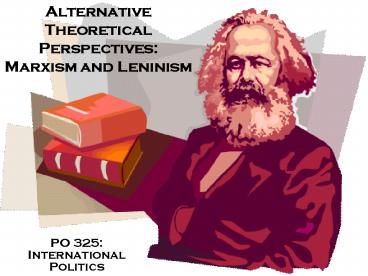Alternative Theoretical Perspectives: Marxism and Leninism - PowerPoint PPT Presentation
1 / 8
Title:
Alternative Theoretical Perspectives: Marxism and Leninism
Description:
Alternative Theoretical Perspectives: Marxism and Leninism PO 325: International Politics Marxism Originally put forth by Germans Karl Marx and Friedrich Engels ... – PowerPoint PPT presentation
Number of Views:185
Avg rating:3.0/5.0
Title: Alternative Theoretical Perspectives: Marxism and Leninism
1
Alternative Theoretical Perspectives Marxism and
Leninism
- PO 325 International Politics
2
Marxism
- Originally put forth by Germans Karl Marx and
Friedrich Engels denies many of the basic
concepts of the major paradigms - Economic Theory of Domestic and International
Relations (i.e., all issues reducible to
questions of economic gain, not political power) - Main Contention The system of economic
production determines the institutional and
ideological structures of a society
3
Marxism Basic Tenets
- All history is the history of economic class
struggle between groups within society - The result of this struggle is, inevitably, the
victory of opposing groups over the ruling group
and the subsequent changing of economic systems - Like all systems before it (hunter-gatherer,
feudalism, etc.), capitalism contains the seeds
of its own destruction
4
The Marxist View of Capitalism
- Proletariat (industrial working class) is
producer of goods in society bourgeoisie, though
contributing nothing, owns the modes of
production, and takes the vast majority of the
capital (proletariat paid subsistence wages) - Bourgeoisie takes more and more of the profit,
widening the economic gap between proletariat and
bourgeoisie - Proletariat grows in size, and starts a
protracted struggle with bourgeoisie, eventually
culminating in revolution - The unfair capitalist system is replaced by one
in which distribution of goods is based on need
and contribution of work is based on ability
5
Marxism and IR Theory
- The economic forces central to Marxism are much
more important than concepts such as state
sovereignty - Indeed, sovereignty and nationalism are viewed by
many Marxists as tools of the bourgeoisie
leadership to obscure class tensions - Thus, the very basis of traditional IR the
nation or state is not the at the heart of
international interaction or the root of
meaningful conflict
6
Leninism and Imperialism
- Lenin, the Russian Revolutionary, developed a
refined theory of how the forces of capitalism
culminate in conflict between states (WWI in
particular) - Reflecting Hobsons views on finance
capitalism, Lenin saw imperialism as being the
inevitable result of the need for capitalists to
invest excess capital (both through the
acquisition of materials and the economic
development of colonial societies)
7
Leninism and Imperialism
- Capitalists from different countries seek to
invest as much excess capital in as many colonies
as possible, inevitably bringing them into
contact with one another - The jostling for spheres of economic influence
in the Third World will lead to major power war,
as it did in 1914
8
How Has Marxism Fared?
- Was at the heart of ideological conflict and
competition since the Bolshevik Revolution of
1917 in Russia - However, no Communist state has be governed by
Marxist theory, or came about as the result of a
Marxist revolution - Centralized economies and strict
authoritarianism, imposed by vanguard of the
proletariat, have largely been total failures































